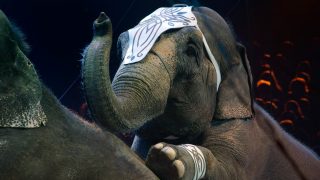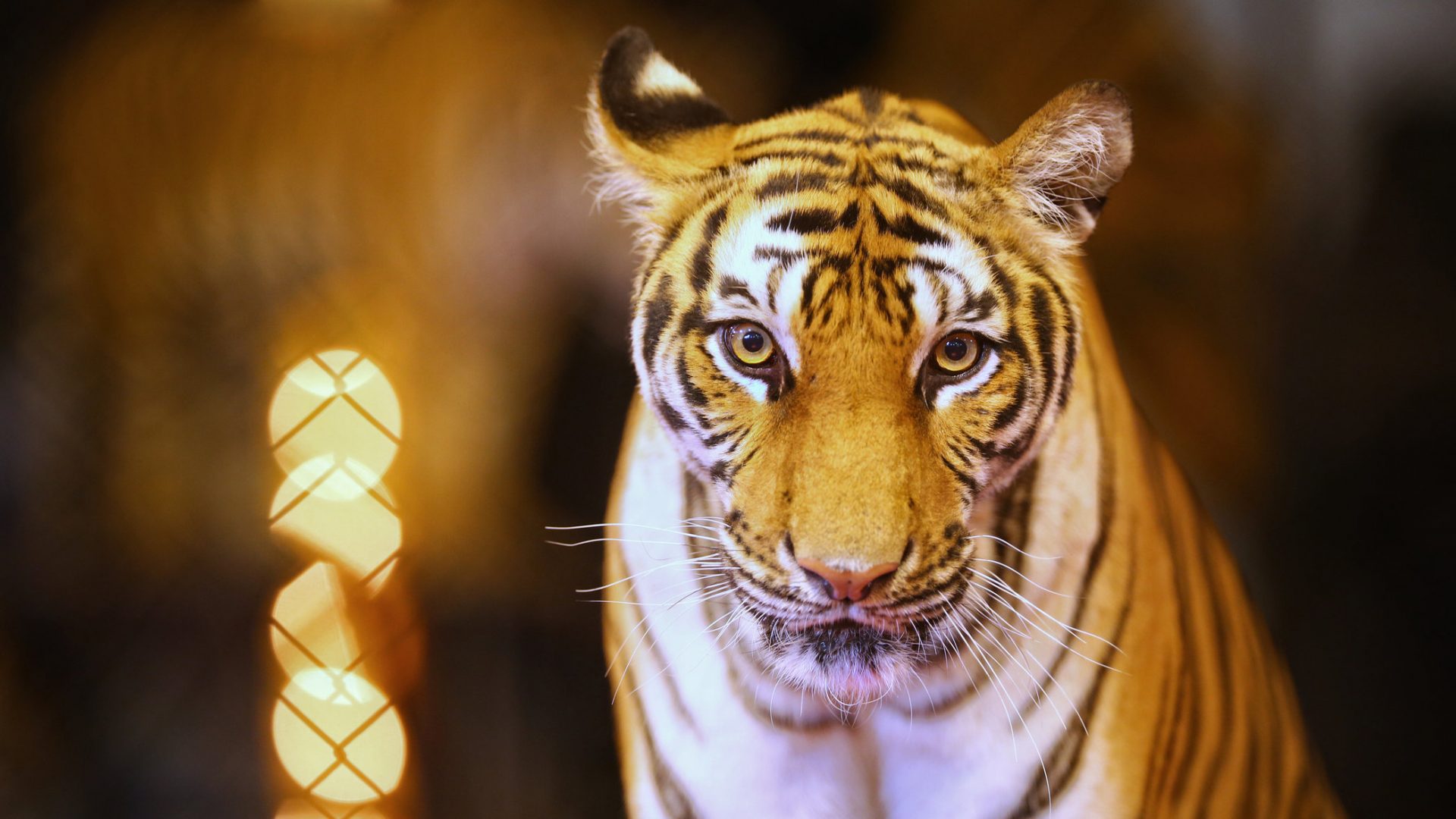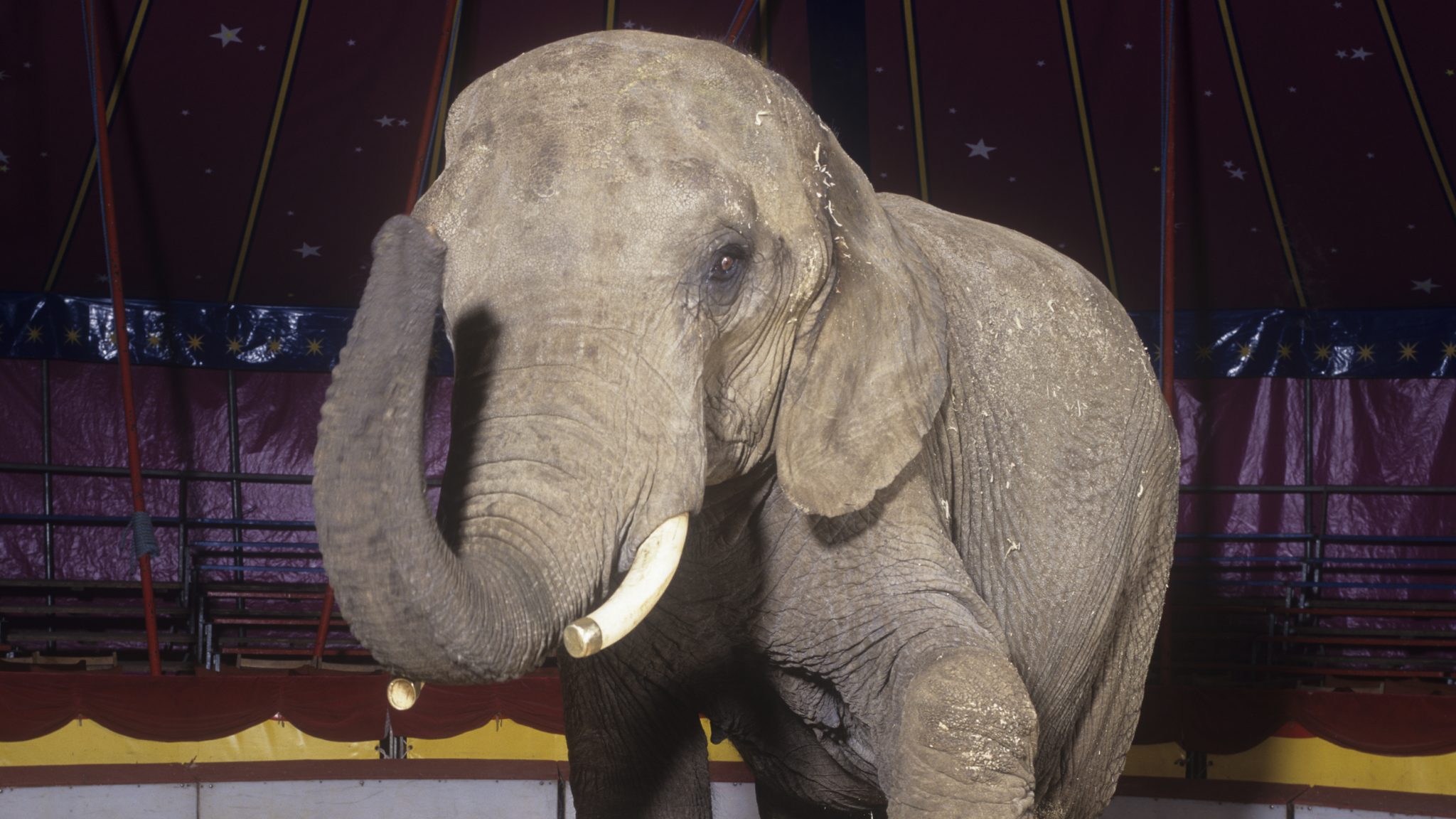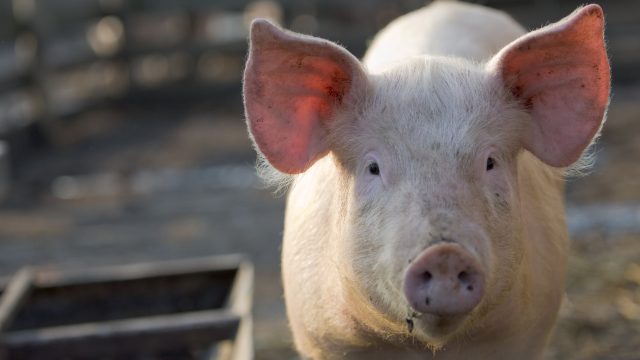
Massachusetts Bans the Use of Certain Wild Animals in Traveling Circus Acts
By Nicole Pallotta, PhD, Senior Policy Program Manager
Contents
Intro
Effective January 1, 2025, Massachusetts’s Bill S.2189 bans the use of several species of wild animals in traveling shows. The new law, signed by Governor Maura Healy in summer 2024, protects elephants, big cats,1 nonhuman primates, bears, and giraffes from being exhibited or forced to perform in mobile acts like circuses, carnivals, and fairs.2 Maryland also enacted a similar law in 2024, which covers all of the same species except giraffes.
The Animal Legal Defense Fund was part of the coalition of animal protection organizations that supported this bill and continues to work to enact similar legislation in other states.
“Constituents Demanded an End to Animal Exploitation for Entertainment”
Sponsors of the bill cited strong public opinion against wild animal acts, overwhelming evidence of inherent cruelty in the circus industry, and the policy goal of enacting state laws that protect animals from abuse and neglect. Rep. Carole A. Fiola, a sponsor of the bill, said:
With over two-thirds of Massachusetts voters supporting the ban on wild animal acts, it’s clear that our constituents demanded an end to animal exploitation for entertainment. This legislation not only reflects that collective desire but also reinforces our state’s commitment to the humane treatment of all animals.
In support of a statewide ban, sponsors also mentioned the growing number of local jurisdictions that have banned circuses—demonstrating how grassroots advocacy can influence state and federal legislation. Because their accumulation signals social momentum and support, local ordinances can eventually lead to the passage of laws at the state and federal level, bringing broader protections to animals.
As House Minority Leader Rep. Bradley H. Jones, Jr., noted of animals used in circuses:
These animals are often subject to cruel and inhumane treatment, including prolonged periods of confinement and other forms of neglect and abuse, all to provide entertainment. While several communities in the Commonwealth have already implemented local bans, a statewide ban on traveling animal acts is long overdue.
The new law covers only traveling acts and thus does not apply to performances that take place “at a non-mobile, permanent institution or other fixed facility if the covered animal is a resident . . . at the same facility.” It also contains an exception for animals used in film production.

A Growing Trend
Massachusetts is the sixth U.S. state to pass what is effectively a statewide ban on traveling circuses that use wild animals. In addition to Maryland’s recent ban, which became effective in October 2024, New Jersey, Hawaii, California, and Colorado have enacted similar laws.
Other states have passed partial bans that apply to a single species or category of animal, such as elephants (Illinois and New York) or endangered species (Kentucky), or that ban implements necessary to subjugate wild animals, such as the bullhooks used to force elephants to perform (Rhode Island). In addition to these state laws, local jurisdictions in a majority of states have implemented some type of ban at the city or county level.
Along with the laws that have been enacted, a federal bill, the Traveling Exotic Animal and Public Safety Protection Act (TEAPSPA), was introduced in 2021 and mirrors state and local bans that prohibit the use of exotic or wild animals in traveling performances. It also exempts “zoos, aquariums, research facilities, wildlife sanctuaries, and other entities,” as well as domestic animals and farmed animals. Worldwide, many countries have enacted full or partial bans on the use of animals in circuses.3
Nosey’s Law
New Jersey was the first state to pass such a ban, dubbed “Nosey’s Law,” in December 2018.4 Captured from the wild at age two, at the time of the bill signing in 2018, Nosey was “a 36-year-old African elephant with crippling arthritis that was forced to travel around the country, including to New Jersey, for traveling circus acts and suffered abuse.” Nosey now lives at the Elephant Sanctuary in Tennessee.5

New Jersey’s ban covers a wide array of species, but excludes domestic animals within the covered scientific classifications.6 So, for example, while Canidae and Felidae are covered, domestic dogs and cats are exempt. Also exempt—although contained within a larger covered category—are domestic cattle, sheep, goats, llamas, horses, donkeys, mules, and more.
Domestic animals have been a common exemption in such laws. For example, California’s sweeping circus ban prohibits the use of “any animal other than a domestic dog, domestic cat, or domesticated horse.” And Colorado’s law is almost identical to New Jersey’s. However, a bill introduced in December 2024 would amend Nosey’s Law to expand the list of covered animals by removing the exceptions for domestic species—which would make it the first state to do so—and adding two new animal classifications: Lagomorpha (rabbits and hares) and Rodentia (rodents).
Upon signing Nosey’s Law in December 2018, Governor Phil Murphy echoed shifting social attitudes when he said: “These animals belong in their natural habitats or in wildlife sanctuaries, not in performances where their safety and the safety of others is at risk.”
Conclusion
In recent years, public sentiment has shifted decisively away from the notion that it is acceptable to force captive wild animals to perform unnatural behaviors for human amusement and profit. Amid growing awareness of the inherent cruelty and public safety risks of such performances, laws that ban the use of wild animals in traveling exhibits have gathered momentum, particularly over the past five years, and we expect to see more enacted in the future.
To learn how you can help pass a local prohibition on animal circuses—and build a foundation for a statewide ban—see the Animal Legal Defense Fund’s webinar, Passing Local Legislation: Prohibiting Animals in Circuses and Traveling Shows.
Further Reading
References
- The bill defines “big cats” as lions, tigers, leopards, clouded leopards, snow leopards, jaguars, cheetahs, mountain lions, or hybrids thereof.
- Performance is defined as “any presentation, exposition, fair, animal act, circus, ride, trade show, petting zoo, carnival, parade, race or similar undertaking in which a covered animal is required to perform tricks, give rides or participate as an accompaniment or be available for the entertainment, amusement or benefit of a live audience.”
- See: https://www.federalcircusbill.org/briefings/worldwide-summary/
- Hawaii’s ban—an administrative rule that prohibits the importation of dangerous wild animals for exhibition in circuses or carnivals—was enacted just one week later.
- Read more about Nosey here: https://www.elephants.com/elephants/nosey
- “Wild or exotic animal” means any live animal that is classified into any of the following scientific classifications: (1) Artiodactyla, excluding domestic cattle, bison, American buffalo, water buffalo, yak, zebu, gayal, bali cattle, suidae, sheep, goats, llamas, or alpacas; (2) Camelidae; (3) Canidae, including any hybrids thereof, but excluding domestic dogs; (4) Crocodilia; (5) Elephantidae; (6) Felidae, including any hybrids thereof, but excluding domestic cats; (7) Marsupialia; (8) Non-human primate; (9) Perissodactyla, excluding domestic horses, ponies, donkeys, or mules; (10) Pinnipedia; (11) Ursidae; and (12) Elasmobranchii, excluding rays.
Sign Up!
Join the Animal Legal Defense Fund's email list to stay up to date on lawsuits, legislation, and regulations affecting animals.
Focus Area
How We Work
Related
-
Court Rules Texas Food Label Censorship Law is Unconstitutional
The law imposed unclear and vague standards on plant-based meat producers that violate the First AmendmentJanuary 29, 2026 Press Release -
State Animal Protection Laws Ranked: Oregon is #1, North Dakota #50
20th edition of ALDF state and territory ranking report highlights major advancements & trends in animal protection across the U.S.January 27, 2026 News -
Over 30 Organizations Urge USDA to Limit Federal Support for Manure Digesters
Hundreds of millions of dollars intended to cut energy costs have been funneled to costly manure digesters, benefitting the largest factory farmsJanuary 15, 2026 News




